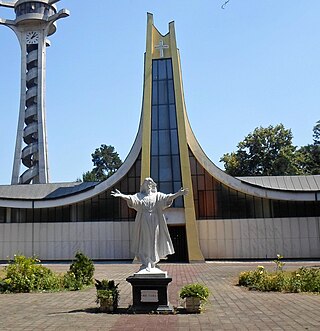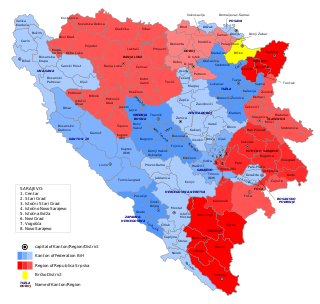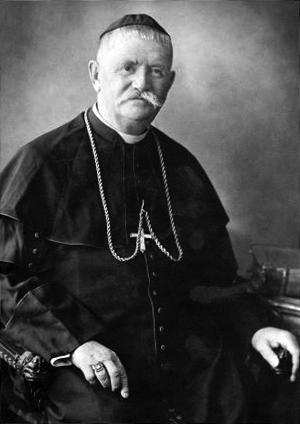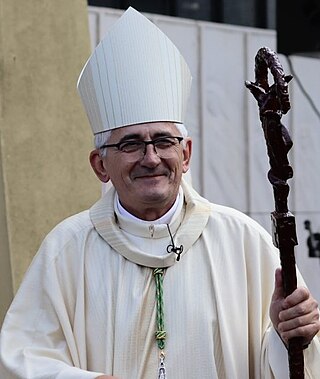
The Catholic Church in Bosnia and Herzegovina is a part of the worldwide Catholic Church under the spiritual leadership of the pope in Rome.

The Diocese of Banja Luka is a Latin Church diocese of the Catholic Church in western Bosnia. The diocese is centred in the city of Banja Luka, Republika Srpska, Bosnia and Herzegovina.

The Metropolitan Archdiocese of Vrhbosna is an ecclesiastical archdiocese of the Catholic Church. Its territorial remit includes the eastern parts of Bosnia and Herzegovina and the entirety of the Republic of North Macedonia. Its episcopal see is the city of Sarajevo (Vrhbosna), the capital of Bosnia and Herzegovina. The archdiocese has the following suffragans: in North Macedonia the Diocese of Skopje; in Bosnia, the dioceses of Banja Luka, Mostar-Duvno and Trebinje-Mrkan.

In Bosnia and Herzegovina, the smallest administrative unit is the municipality. Prior to the 1992–95 Bosnian War there were 109 municipalities in what was then Socialist Republic of Bosnia and Herzegovina. Ten of these formed the area of the capital Sarajevo.

The country calling code of Bosnia and Herzegovina is +387.

The Central Bank of Bosnia and Herzegovina is the central bank of Bosnia and Herzegovina, located in the capital city, Sarajevo.

Alojzije Mišić was a Bosnian Croat Franciscan and prelate of the Catholic Church who served as the bishop of Mostar-Duvno and the apostolic administrator of Trebinje-Mrkan from 1912 until his death in 1942.
This is a survey of the postage stamps and postal history of Bosnia and Herzegovina.
Franciscan Province of Herzegovina of the Ascension of the Blessed Virgin Mary is a province of the Catholic religious order of the Order of Friars Minor, commonly known as Franciscans. It was established in 1843 when it seceded from the Franciscan Province of Bosna Srebrena. Its headquarters are in Mostar.

The Bishops' Conference of Bosnia and Herzegovina is the permanent assembly of Catholic bishops in Bosnia and Herzegovina founded in 1994 by the Holy See.
Bosnia and Herzegovina was represented at the Eurovision Song Contest 2001 with the song "Hano" written and performed by Nino Pršeš. The Bosnian-Herzegovinian participating broadcaster, Public Broadcasting Service of Bosnia and Herzegovina (PBSBiH), selected its entry for the contest through the national final BH Eurosong 2001. They returned to the contest after a one-year absence following their relegation in 2000 as one of the six entrants with the lowest average scores over the previous five contests. Nineteen entries participated during the show on 10 March 2001 and an eight-member jury selected "Hano" performed by Nino Pršeš as the winner.

Paškal Buconjić was Herzegovinian Croat Franciscan and a prelate of the Catholic Church who served as the first bishop of Mostar-Duvno from 1881 to 1910, as the apostolic administrator of Trebinje-Mrkan from 1890 to 1910, as the apostolic vicar of Herzegovina from 1880 to 1881, and as custos of the Franciscan Custody of Herzegovina between 1874 and 1879.

Petar Palić is a Bosnian-Herzegovinian prelate of the Catholic Church who is currently the bishop of Mostar-Duvno and apostolic administrator of Trebinje-Mrkan since 2020.

Ex hac augusta Principis Apostolorum cathedra is a papal bull issued by Pope Leo XIII on 5 July 1881, by which he restored the regular Church hierarchy in Bosnia and Herzegovina after its occupation by Austria-Hungary from the Ottoman Empire, with Archdiocese of Vrhbosna seated in Sarajevo having three suffragan dioceses: Banja Luka, Mostar-Duvno and Trebinje-Mrkan, with latter being under the administration of the bishop of Dubrovnik.

Lazar Lazarević was a Herzegovinian Croat Catholic priest who served as the bishop's deputy (provicar) for the Diocese of Trebinje-Mrkan from 1867, and as spiritual administrator of the Diocese of Mostar-Duvno and Trebinje-Mrkan from 1910 until 1912. Lazarević was a supporter of the independence of the Diocese of Trebinje-Mrkan from the administration of the neighboring dioceses.

Željko Majić is a Bosnian-Herzegovinian prelate of the Catholic Church who is currently the bishop of Banja Luka since March 2024. Before his appointment, Majić served as a vicar general of the dioceses of Mostar-Duvno and Trebinje-Mrkan from 2012 to 2021.














